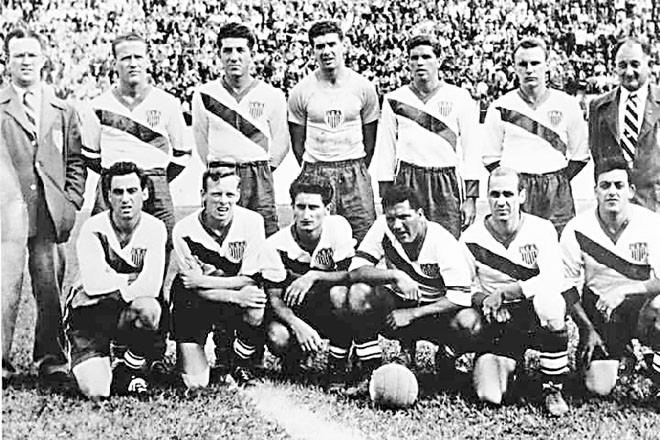

All FIFA World Cups witness unexpected results with the underdogs sometimes prevailing over higher-ranked opponents. It is these ties that make the most loved event even more fascinating to watch and follow.
In the ongoing World Cup in Brazil, the group phase saw Costa Rica and Chile defeating Italy (four times champions) and Spain (defending champions), respectively. One of the greatest, if not the greatest of all the upsets, occurred in 1950 when Brazil last hosted the World Cup. It was the England versus USA match.
England were making their World Cup debut in 1950. The English Football Association had boycotted the first three tournaments owing to a dispute with the FIFA over payments made to amateur players. England were regarded as the "Kings of Football" at the time. Their post-World War II record stood at 23 wins, three draws and four losses. Just two weeks before the World Cup, England had beaten the mighty Italians 4-0 and the Portuguese 10-0 in Lisbon.
The Americans, though one of the semi-finalists in the inaugural edition of 1930, had become sort of an international punching bag.
They had lost their last seven matches, including heavy defeats to Italy (7-1), Northern Ireland (5-0) and Norway (11-0).
The US team comprised part-time players, including a dishwasher, two postmen, a teacher and a millworker. One drove a hearse for a funeral parlour. One player had to withdraw from the tournament because he could not get time off work.
The team America was on a budget so tight they could not be sure until the last minute that they would be getting new kits for the tournament.
The hastily assembled team had only been able to train together once, the day before they left for Brazil.
In comparison, the 1950 England squad was awesome. Captained by the legendary Billy Wright, the first player in the history to gain a hundred international caps, it also had some other all-time England greats such as Stanley Matthews, Stan Mortensen and Tom Finney.
The departure was also glamorous as they assembled at the airport for the newsreel cameras looking extremely confident. Most of their fellow countrymen were very optimistic; it seemed as if they were heading for Brazil to lift the Cup rather than to compete for it.
Billy Wright delivered a modest speech but expressed great hope to return as the world champions.
The odds of England winning the World Cup were 3:1; the odds of the Americans were 500:1.
Only one American journalist attended the World Cup, and he too had come at his own expense.
When the two sides came to face each other in Belo Horizonte, it was their second match in the four-team group.
Their respective first ties had gone according to the script with England having beaten Chile 2-0 and the United States losing 3-1 to Spain.
The American coach Bill Jeffrey told the media, "We have no chance." He even declared his players "sheep to be slaughtered". The leading English newspaper Daily Express suggested, "It would be fair to give the US three goals of a start."
England made a storming start with six clear shots on goal but to no avail: two shots hit the post, one went over the top, and another was brilliantly saved by the American goalkeeper, Frank Borghi.
The US attacks were rare. They had their first attempt on the goal in the 25th minute which was blocked by the English net minder Bert Williams.
But the English raids were coming in waves. Minutes 30, 31 and 32 saw three successive attempts: two went over the cross bar and a Tom Finney header was tipped away by Broghi.
In the 37th minute, Bahr had a long shot from 25 yards. As Williams moved to his right to intercept, the rampaging Gaetjens dived headlong near the penalty spot and just grazed the ball to send it left of the English goalkeeper.
The crowd supporting the underdogs exploded. They all supported the Americans as the Brazilians desired England, a potentially dangerous challenger to Brazil in the later stages, to exit early.
The US began the second half with greater confidence. Still, it was the more professional English side which looked more threatening and had an excellent opportunity in the 59th minute when they had a direct free kick. But it was well saved by Broghi.
Then with just eight minutes left, Mortensen was brought down illegally at the edge of the American penalty area. England pleaded for a penalty but the referee decided it was outside the box.
From the resulting free kick, Jimmy Mullen’s header appeared sailing into the goal but Borghi somehow tipped it away at the last instant.
The English players protested but the referee ruled the ball had not crossed the goalline. That is how it ended. What was unthinkable a few hours ago had happened.
The lone American journalist remarked, "The US victory was as if Oxford University sent a baseball team over America and it beat the New York Yankees."
England still could have kept their hopes alive by winning the last group game against Spain. Shell shocked by the defeat against the Americans, they lost 1-0.
The US also exited when they were defeated by Chile -- but they had ended England’s dream. The US failed to qualify for the next World Cup till 1990.
The remarkable match and the US team were profiled by author Geoffrey Douglas in his book "The Game of Their Lives", which was later translated into a film of the same name.